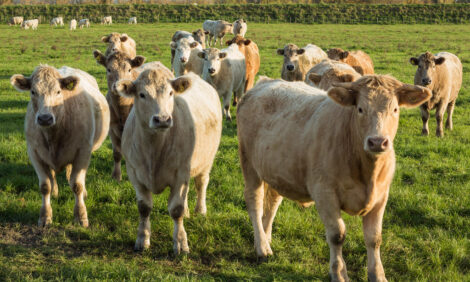



New Study Into Precision Dairy Farming
US - A research and extension team led by dairy systems management extension specialist Jeffrey Bewley, University of Kentucky College of Agriculture Department of Animal and Food Sciences, is embarking on a two-year study to advance precision dairy farming at the UK Coldstream Dairy Research Farm.Using several different technologies, the team of scientists, veterinarians and dairy farmers will gather biological and observational data that indicate health status and estrus behaviour. Detection of heat stress, the onset of calving, lameness, and early detection of mastitis, metritis, and metabolic disorders are also areas of interest.
“The economics of animal disease are huge and often unrecognized. Early detection of disease reduces the cost of disease to the farm and increases the length of animals’ lives”, Mr.Bewley said. “Heat detection is a major struggle for dairy farmers, and technologies that can help catch cows in heat can have a huge impact on dairy profitability”.
This long-reaching study uses both cutting-edge and more familiar technologies to bolster herdsmen’s skills in studying physiology and behavior in dairy cattle, particularly as it relates to illness and estrus.
A milking system will measure drops in yield in each quarter of the cow’s udder, and in particular, electrical conductivity of the milk at the quarter level during milking. There is an indirect connection between electrical conductivity and mastitis. Tags will measure rumination, or cud chewing, providing an opportunity to react quickly to, say, onset of illness or disadvantageous feeding changes, at the single-animal and herd level. A second set of tags will take the surface temperature of the inside of the right ear of each fresh cow every five minutes. Another technology will monitor lying behavior and activity. And a passive bolus system will monitor animal core temperature, which provides information for early disease detection, ovulation detection and parturition. Finally, an eartag will monitor ear temperature and activity to identify potential peripheral shock (cold extremities), which may be particularly useful for early identification of milk fever.
Combined, these devices will provide data that measures cow comfort, which can then be extrapolated to make changes in the dairy’s facilities. Cow comfort can lead to better overall health, which lowers the cost of animal care and/or treatment and can increase animal longevity and boost milk yield.
The data from this study will be used to assess the economic impact of precision dairy farming technologies on a farm’s bottom line. The technologies are highly developed but may not be economically viable for most farmers yet.
Mr Bewley continues, “Our goal is to determine how useful the information provided by these technologies is and then to conduct analysis to determine whether they are worthwhile investments. The research we are doing will help dairy farmers make decisions about the usefulness of these technologies”.
Over the long term, Mr Bewley believes the study will connect the dots between what the herdsman sees and what the technologies say. Further, he hopes his research will enable these technologies to enter the competitive marketplace, boosting the bottom line of Kentucky dairy farmers, who increasingly compete on a national and global platform.
DVM Systems, LLC, IceRobotics, Micro Dairy Logic, Milkline, NetQuest Services, Pfizer, and SCR Engineers are partners in this study.
TheCattleSite News Desk


